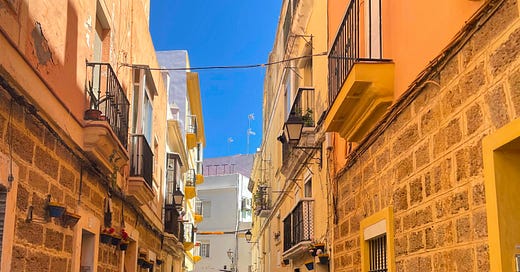Spanish Sweet Nothings
A short reflection on language, culture, and the tiny phrases that make you feel seen.
I’ve been learning Spanish for most of my life. Like many kids, I started in school – numbers, colors, animals – building slowly toward conversational grammar and vocabulary. But no textbook prepared me for the Spanish spoken out in the real world.
Because once you actually live in a Spanish-speaking country, you start learning a completely different dialect. Not just how to order a coffee or ask for directions, but how people really talk. The slang. The swearing. The casual insults. And my favorite: the terms of endearment.
Take, for example, a phrase I heard early on in Spain that stopped me in my tracks: “¡Me cago en la leche!”. Literally, “I poop in the milk.” I remember trying to work that out in my head, wondering what the hell that could possibly mean.
But it doesn’t stop there. If the frustration is deeper, you might hear “¡Me cago en la madre!” (I poop on the mom). And at full-blown rage level, there’s “¡Me cago en tus muertos!” (I poop on your dead ancestors).
So depending on how bad the situation is, you threaten to defecate on anything from someone's breakfast beverage to their entire family line.
It’s wildly expressive. It’s completely untranslatable. And it definitely wasn’t in my school books.
But of all the strange, vivid turns of phrase I’ve come across, my favorite by far are the Spanish terms of endearment. There is nothing quite like being affectionately insulted or adored by a Spaniard.
Let me explain:
Gordi / Gorda – Literally “fatty,” but it’s often used sweetly, like “hun” or “love.” You hear it from your mother-in-law or your neighbor at the fruit stand, asking, “¿Qué pasa gordi?” Still, it’ll have you double-checking your snack choices that day.
Reina – “Queen” Once, an 80-year-old abuela said it to me while complimenting my hair. I floated out of that interaction ready for whatever came my way.
Guapa / Guapo – “Beautiful” It’s used so freely in Spain it almost feels like punctuation. The cashier at the mall, the waiter handing you your breakfast, even a stranger passing you on the street might toss it your way. At first, you think, Surely they don’t mean me? But after a while, you start to believe it and walk home feeling a little taller.
Mi vida – “My life” / Mi cielo – “My heaven” / Mi alma – “My soul”
Used by your parents or your partner, these are the kinds of phrases that melt you instantly. After being called mi vida, my husband can do absolutely nothing wrong for the next 24 hours.
There’s something so raw and lovely about it all, these deeply emotional words tossed out so casually, so openly. The kind of thing you’d expect to be whispered in a private moment, instead dropped mid-conversation while unloading the groceries.
It’s taught me a thing or two about culture and connection – really it’s a culture of connection. A simple, vulnerable, daily reminder of how important you are to them. Of how interactions with strangers don’t have to be so cold.
Maybe that’s what I love most about the language here — not just what it says, but what it offers. An easy kind of closeness. A shared understanding that you don’t have to know someone to treat them like they matter.
It turns out language isn’t just about grammar and vocabulary. It’s about how people let you in. Fluency is great – but this? This is what makes you feel like you belong.





What a beautiful picture you have created of the love through the Spanish language, Mel. Thank you for sharing. I so enjoy everything you write.